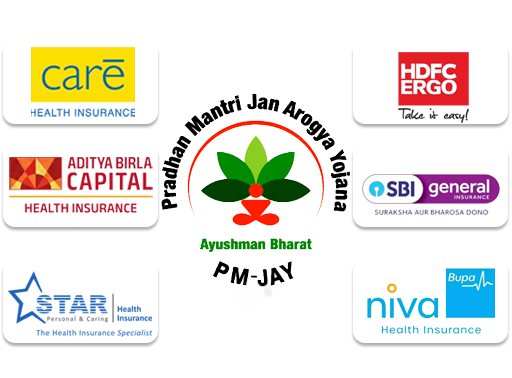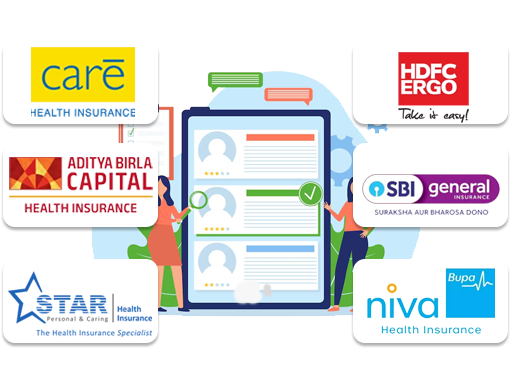- Benefits of Mental Illness Coverage?
- Best Plans For Mental Illness Coverage
- How To Check About Mental Illness Coverage In Your Plan?
Mental Illness Coverage
You might have noticed your friend who usually stays calm is behaving very rudely someday. Have you understood why, maybe she fought with someone? Or maybe her life is a little harsh to her? Whatever the reason is, her mental health is affected. Sometimes, it is as critical as physical health and might need a doctor's help. Certainly, the fees for mental health are also equal to the normal physical health doctor's and can drain your pocket brutally. But having health insurance for mental illness can save you from this situation.
Before delving deeper into this discussion, let's first understand,
What is Mental Illness?
Mental health is a broad term. It can impact your thoughts, feelings, and how you cope with life regularly. Mental illness is part of mental health. It is a health condition that can significantly disrupt your thoughts, emotions, and behaviours. It can cause distress and affect day-to-day life, and relationships, both on personal and professional levels.
Key Takeaway Points for Mental Illness
- It is more than just sadness or occasional stress. It is more persistent and severe, impacting daily life in a significant way.
- It has different types and symptoms.
- Of course, it is treatable. You can manage the conditions effectively with therapy, and proper medications.
- No worry, it is common. 1 in every 5 individuals experiences mental illness, so you are not alone.
- And remember, mental illness is not a weakness or a character flaw. It is a health condition that deserves understanding, compassion, and proper treatment.
Here are,
Some Common Types of Mental Illness
- Anxiety disorder
- Bipolar affective disorder
- Depression
- Eating disorder
- Obsessive Compulsive Disorder
- Paranoia
- Schizophrenia
- Psychosis
- Post-traumatic stress disorder
And much more...
Know More About- Mental Illness Vs Mental Health
Need of the Hour for Mental Illness Health Insurance
Certainly, there has been enough concentration laid on the rapidly increasing physical health complications in the country due to several reasons such as environmental pollution, sedentary lifestyle, etc and the need to protect people with a strong insurance system that provides sufficient financial protection against various kinds of illnesses.
What Data Says?
If numbers are to be believed then:
- According to World Health Organisation (WHO) studies, over 90 million Indians, which is 7.5 per cent of the country's population are suffering from some form of mental disorder.
- A 2019 study by the British Charity named Mental Health Research UK, found that 42.5% of the employees in India's corporate sector suffer from depression or anxiety. And trust me this is almost every second employee.
- According to the National Mental Health Survey 2016, about 130 million people require mental health services.
- The online queries for psychiatry grew by 50% during the COVID-19 pandemic.
- Most of the people are from the age group of 21-30 years who raised queries regarding mental illness.
The above given numbers as well as the excessive number of people being vocal about their psychiatric illness have demonstrated an urgent need for a mental healthcare system in India. This will include proper infrastructures and facilities for the patients battling with such challenges and this includes health insurance too.
New Scenarios of Mental Illness Coverage in Health Insurance!
The Mental Healthcare Act 2017, which was implemented in 2018, directs every health insurance provider to add mental illness health insurance too. Also, IRDAI has mandated all insurance providers to curate specific mental illness-dedicated plans for those who need help with mental illness.
One notable alteration of the act is that patients now have the freedom to choose from a range of mental healthcare facilities The law ensures several fundamental rights, including social inclusion, privacy, access to health information, protection from cruel or inhumane treatment, and the prohibition of discrimination. Even underprivileged and homeless individuals with mental illnesses are eligible for free mental health therapy, regardless of their economic status.
Details of Plans that Cover Mental Illness
-
HDFC ERGO My:Health Suraksha
My:Health Suraksha plan by HDFC ERGO is a comprehensive plan that offers coverage for multiple medical issues including mental healthcare. HDFC ERGO as a company believes that mental healthcare is as important as physical health. Thus you will get coverage for even hospitalisation expenses due to mental illness. And the good news is that your premiums will be starting at just Rs 19 a day. Additionally, with HDFC ERGO health insurance you will get the Sum Insured up to Rs 1 Crore.
-
NIVA BUPA Aspire Plan
With the WellConsult OPD Wallet benefit, you can avail the benefit of 10 cashless sessions on emotional wellness, through the app of NIVA BUPA Aspire Plan. NIVA BUPA Aspire plan is a new plan by the company that gives complete and extensive coverage to the policyholders. Along with mental health counselling, you will get to know about the activities that you can do to maintain your mental health. You will get upto Rs 1 crore of Sum Insured with Aspire plan.
-
Digit Health Care Plus
Digit Health Care Plus offers coverage for hospitalisation and other medical expenses for psychiatric illnesses and disorders like Schizophrenia, Schizotypal, neurotic, stress-related disorders, unspecified mental disorders, affective disorders, and somatoform disorders. With the Digit Health Care Plus plan, you will get a sum insured back up which is 100% of your sum insured amount.
-
Niva Bupa Go Active Plan
With the Niva Bupa Go Active Plan, you will get complimentary mental care in case of trauma. It is a comprehensive plan that offers coverage to families and individuals. Avail hassle-free claims with the plan. With the mental care benefit, you will be provided with extensive care if there is any trauma, like an accident or other such related situations.
Specifications Needed For Mental Health Insurance
It is important to note that mental health insurance aims to provide coverage for future treatment and support, regardless of past conditions. Here are a few eligibility criteria:
- Age
Most insurance policies have a minimum and maximum age limit for enrollment. Typically, individuals above 18 years of age can apply for mental health insurance coverage. - Pre-existing Mental Health Conditions
Many insurance companies may assess the presence of pre-existing mental health conditions before providing coverage. Pre-existing condition exclusions or waiting periods may apply to some insurance. - Medical History
Insurers may consider an individual's medical history, including any past or current mental health issues, treatments, or hospitalizations. - Premium Payment
Eligibility for mental health insurance is also contingent on paying the required premiums. Premiums are typically based on factors such as age, medical history, coverage limits, and selected policy features. - Insurer's Policy Guidelines
Each insurance provider may have its own specific guidelines and requirements for mental health insurance eligibility.
Important Things to Notice
With people are being vocal about psychiatric issues, the insurance sector is also inching towards preparing a comprehensive plan to provide aid against different nature of mental illnesses. Currently, working towards building constructive plans, the health insurance companies have also put caps on the facilities offered in their health care plans in the form of various sub limits or exclusive with regards to the mental illness.
From the above definition, it is clear that mental retardation is excluded. The Act includes mental conditions associated with the abuse of alcohol and drugs. However, this has been put under exclusions by almost all insurers.
In case, there is pre-existing mental condition with the customer, either it is not covered in the policy or the plan is modified according to their health conditions.
The waiting period is a big tool that has been used to keep the mental illness expense at the bay for some time. In fact, some of the plans have a clear restriction on the percentage of the sum insured to be spent on a mental illness.
There could be few more exclusions specific to mental illness and also certain waiting periods for some of the illnesses, these remain to be seen. As of now, most brochures and policy documents exclude mental illness in this way - "Treatment of any mental or psychiatric condition including but not limited to insanity, mental or nervous breakdown / disorder, depression, dementia, Alzheimer's disease."
Hence, it is always advised to thoroughly read, analyse and compare different plans in order to select the right one which is suitable for your mental health condition.
Case Study
Recently, a policyholder of Niva Bupa Health Insurance, who has been paying premium for a sum insured INR 35 Lakh, was denied claim settlement raised for the mental treatment. The condition given to him by the insurer stated that in case of a mental illness the sum assured is restricted to ₹ 50,000.
When the insured approached the Delhi High Court to seek justice, the apex body referred the Mental Healthcare Act of 2017, an act that clarifies that there can be no discrimination between mental and physical illnesses and the insurance provided in respect thereof.
While the matter is pending with the apex body as of now but concurrently, the Delhi High Court has notified that "this matter requires consideration, in as much as the Insurance Regulatory and Development Authority of India ought to place on record the basis on which approval has been granted for such insurance policies".
Know What's Covered- Inclusions
As insurance becomes mandatory for every insurance provider to offer to its customers, here are the details of what a mental health insurance policy will cover:
-
All the major mental health issues
A mental health insurance will cover most of the diseases that fall into the category. Ranging from anxiety, depression to complex and difficult to identify and treatments, every issue related to mental sickness is covered under such policies. -
Inpatient and outpatient procedures
Earlier, the health insurance companies only covered hospitalization expenses that rose out of mental health issues. Mostly, the mental health issues are corrected by behavioral therapies and thus require OPD. As the government guidelines have changed, now inpatient and outpatient procedures are well covered by these policies. -
All other medical expenses
Sometimes, the treatment is not confined to the hospital and therefore, the new age mental illness cover involves pre and post hospitalization charges, treatment recovery, medical tests, and much more as specified in the plan. -
List of diseases
Companies have a list of mental illness that is borne by them, these are some of the known diseases that fall in the list of mental illness: Acute Depression, Bipolar disorder, Schizophrenia, Anxiety disorders, Obsessive-compulsive disorders, Attention-deficit/hyperactivity disorder, Post-traumatic stress disorder, Mood disorder, Psychotic disorder. -
Coverage for therapy sessions
Policyholder's hospitalization and therapy expenses towards treatments of mental illnesses will be covered too. -
coverage for critical mental illness
Diseases like depression, dementia, bipolar disorder and Alzheimer's shall be covered with some exclusions, decided by the insurer.
What is Not Covered?- Exclusions
-
Pre-existing mental illnesses
If you have a pre-existing mental illness, your insurance policy may not cover it for a certain period. The duration of this exclusion period may vary from insurer to insurer. -
Self-inflicted injuries
If you intentionally harm yourself, such as in the case of attempted suicide, your insurance policy may not cover the costs associated with the treatment of any injuries sustained. -
Substance abuse
Mental illness coverage policies may not cover the treatment of mental health issues caused by substance abuse or addiction. -
Experimental treatments
Treatments that have not been widely acknowledged by the medical community are considered experimental and may not be covered by mental health insurance coverage. -
Alternative therapies
Some alternative treatments, like yoga, acupuncture, and hypnosis, could not be covered by mental illness coverage. -
Mental Retardation arising due to substance abuse
Mental illness health insurance generally does not cover mental retardation or mental illnesses arising from drug or alcohol abuse. So it is very necessary to differentiate between inherent mental health conditions and those resulting from external factors. -
Outpatient Treatment
While mental health insurance may cover hospitalization expenses, it is important to note that outpatient treatments such as consultations and therapy sessions may not be covered by most plans. -
Waiting Periods
Many mental illness plans have waiting periods specifically for certain mental disorders. It is essential to check the policy details and be aware that no compensation will be paid for treatment related to these specific disorders during the waiting period. It is essential to review the policy to understand the extent of the outpatient coverage provided.
Things to Know About Mental Health Insurance
- As per new guidelines Insurance companies in India cannot simply reject new policy applications for people with mental illness.
- Insurance companies must include mental illness in their health insurance policies.
- Few insurers and policies even cover consultations and counseling for mental illness, and this is covered under the OPD benefit of health insurance.
- More critical diseases like depression, dementia, bipolar disorder and Alzheimer's are also covered by a few insurance companies.
- Mental Health Insurance Coverage also includes hospitalization and therapy expenses, this includes diagnostics, medications, treatment costs, room rent and even road ambulance charges.
- Companies generally provide mental illness benefits with a waiting period ranging from 90 days to 2 years. This depends on the policy you opted for, check the details of the policy before buying.
- To raise the claim for hospitalization, the minimum time of hospitalization for a mental illness patient has to be 24 hours.
How To Verify If Your Insurance Provider Covers Mental Illness?
Register and log on to your insurance account online
Your health insurance plan website should contain information about your coverage and costs you can expect. Since insurers offer a variety of plans, make sure you're logged on and viewing your specific insurance plan.
If you're required to choose a treatment and hospitals that's in your plan's network, a list of network providers should be available online.
Call your insurance provider
If you need additional information, call the toll-free number on the back of your insurance card and ask questions about the types of mental or behaviour assistance program services you can expect coverage for, as well as any out-of-pocket costs you may incur.
Ask the therapist
Therapists, counsellers and other mental treatment related hospitals often change the insurance plans they're willing to accept and may have opted out of your plan.
Claim Process of Mental Health Insurance
It is very important to know about the claims procedure of a particular plan in order to avoid future discrepancies. The claims process for mental health insurance is as follows:
Step 1: The first step in the claims process is to seek diagnosis and treatment from a qualified mental health professional. They will provide the necessary documentation and medical records to support your claim.
Step 2: Once you have received the required treatment, contact your insurance provider to initiate the claims process.
Step 3: Prepare the necessary documents, which may include medical reports, prescriptions, invoices, and treatment receipts.
Step 4: Fill out the claim form provided by the insurance company accurately and provide all the requested information.
Step 5: Submit the completed claim form along with the supporting documents to the insurance provider within the specified time frame mentioned in your policy.
Step 6: The insurance provider will review your claim and assess its validity based on the submitted documentation. If necessary, they may also ask for clarification or further details.
Step 7: If your claim is approved, the insurance provider will process the claim and provide the reimbursement or payment for the covered expenses as per the terms of your policy.
Conclusion
Mental illness is a common problem in today's fast-paced world. But it has been stigmatised and avoided for a long time by our society. However, there have been enough conversations on the physical health complications and mental illness due to the stigma attached. But, we need to appreciate the Mental Healthcare Act 2017, which gave limelight to the scenario. And appreciate the efforts of health insurance companies who are working on adding new health insurance plans for mental illness.
Get in touch with the expert if your loved ones or you feel depressed in life. You can easily contact PolicyX in case of any doubt about mental illness health insurance.
Health Insurer Network Hospitals
Mental Illness Covered in a Health Insurance: FAQs
1. Is there a specific type of insurance plan that covers mental illness?
Mental health coverage is often included in comprehensive health insurance plans, including both family floater and individual plans.
2. Are there any limitations or restrictions on mental health coverage?
Some insurance plans may have limitations on the number of therapy sessions covered, require pre-authorization for certain treatments, or have restrictions on specific medications.
3. Can I use my insurance for both inpatient and outpatient mental health treatment?
Yes, insurance coverage can apply to both inpatient and outpatient mental health treatment, although specific coverage details may vary.
4. Does insurance cover alternative or complementary treatments for mental illness health insurance?
Insurance coverage for alternative or complementary treatments, such as acupuncture or herbal remedies, may vary and typically has more restrictions.
5. What is the minimum and maximum age for Mental illness coverage?
There is a minimum age requirement of 18 and a maximum age limit of 65 or no upper age limit; this will entirely depend on the company.
6. Who needs cover for mental health?
An individual with these symptoms of Acute Depression, Bipolar disorder, Schizophrenia, Anxiety disorders, Obsessive-compulsive disorders, Attention-deficit/hyperactivity disorder, Post-traumatic stress disorder, Mood disorder, or Psychotic disorder needs cover for mental health.
7. What is the waiting period for mental health insurance coverage?
Generally, the waiting period for mental health coverage ranges from 90 days to 2 years, it depends on the insurer and the policy you have opted for.
Health Insurance Companies
Know More About Health Insurance Companies
Share your Valuable Feedback
4.4
Rated by 2627 customers
Was the Information Helpful?
Select Your Rating
We would like to hear from you
Let us know about your experience or any feedback that might help us serve you better in future.


Written By: Simran Saxena
An explorer and a curious person, Simran has worked in the field of insurance for more than 3 years. Travelling and writing are her only passion and hobby. Her main agenda is to transform insurance information into a piece that is easy to understand and seamlessly solves the reader’s query.






















Do you have any thoughts you’d like to share?